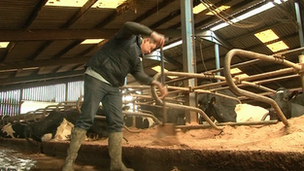Powys 'mega dairy' plan gets go-ahead after public inquiry
- Published

The Welsh government called in the proposals after the council rejected the planning application
A farmer's plan to build a 1,000-cow dairy next to a school has been given the go-ahead despite the public inquiry inspector saying it should be refused.
Planning Minister Carl Sargeant said the economic benefits outweighed other considerations.
A public inquiry was held about the plans for the dairy in March.
The farmer behind the scheme at Lower Leighton Farm said he was delighted, but animal campaigners called it a black day for Wales.
In a letter detailing his decision to grant planning permission to farmer Fraser Jones, Mr Sargeant said the proposed development had social and environmental implications but that these were outweighed by economic benefits.
Mr Sargeant said that although the planning inspector had recommended refusing the plan, he did not accept the recommendation.
In his letter, he stated that the planning inspector had considered the main issues over the application included:
The effect on the character and appearance of the area
Slurry spreading and disposal of waste water
The impact on residents of odour, noise and the need for pest control
Residents' health, including children at the local primary school
Animal welfare
Human rights
The inspector had recommended that the planning permission application be refused on the grounds it would conflict the area's unitary development plan.
But Mr Sargeant wrote: "I agree with the inspector that these are relevant issues, but I also consider that the economic aspects of the proposed development are a main consideration in the determination of this application."
Environment correspondent Iolo ap Dafydd explains the significance of the decision
'Incredulous'
The dairy plans include three large buildings, a fodder storage unit, two slurry stores and a water storage tower.
People opposed to the scheme formed an action group called Campaign Against Leighton Farm expansion (CALFe).
They complained the dairy would be too close to their homes and the school and raised objections about noise, the smell, flies, pollution, increased traffic, the size of the development and its visual impact.
Farmer Fraser Jones said he was "very pleased" with the minister's decision
Simon Pope, from the World Society for the Protection of Animals (WSPA UK) said: "WSPA is incredulous that expert planning advice has now been twice ignored, both at county and national level.
"This is a dark day for Wales and for Welsh dairy farmers, who have protected this beautiful landscape for generations.
"The inspector felt on balance that this application was contrary to the Welsh assembly's own policies on development."
Leighton resident Holly Dyer, whose son and daughter attend the primary school, said some parents had threatened to move their children if the dairy won approval.
Mrs Dyer, a member of CALFe, said: "I'm really upset, surprised and shocked by the decision.
"There has been big concerns about the health aspects associated with the diary and the affects on the school children."
Planning process
She said CALFe members, who raised £8,000 to employ a barrister to represent the group at the public inquiry in March, would be meeting soon to discuss their next step.
Mr Jones's dairy proposal also attracted criticism from the National Trust which was concerned about the visual impact on nearby Powis Castle, while Compassion in World Farming had claimed Mr Jones's plans were factory farming.
But the farmer, who currently milks 300 cows, has said he had gone to great lengths to address concerns and has included measures to monitor flies, the smell and animal welfare in his proposals.
But the National Farmers' Union deputy president in Wales, Pembrokeshire dairy farmer Stephen James, said new larger dairies were nothing to fear.
The government inspector visited the planned dairy site in Leighton last March during the eight-day public inquiry.
In response to his application being granted, farmer Mr Jones said he had always felt he had a good case and that he had put a strong proposal forward.
- Published20 August 2013
- Published15 March 2013
- Published5 March 2013
- Published23 October 2012
- Published25 January 2012